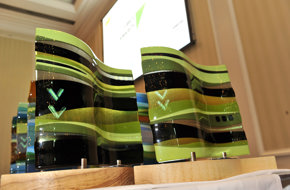Highlights
- Annually, 200 million recycled hangers are returned to the supply chain in place of new ones, saving 700 tonnes of carbon dioxide and 97% of energy.
- Use recycled material, where possible equating to more than 3000 tonnes less virgin polymer being used each year.
- Reduced electricity per product year.
- ISO14001 in place accredited in 2004 and certified until 2015.
- Environmental performance is instrumental in winning and securing contracts and customers.

Mainetti UK Ltd was established in Jedburgh in 1974. Through manufacturing and recycling processes it supplies more than 300 million clothes hangers to high street retailers. Over time, and in conjunction with customers, the company has recognised the need for more sustainable, low carbon products and services.
In partnership with customers, the company is able to produce recycled hangers using less energy than required to make new ones. Annually, Mainetti UK return 200 million recycled hangers into the supply chain instead of manufacturing new ones.
The VIBES judges were impressed by the company’s commitment to environmental and sustainability issues, and how it is core to the way in which the company does business. Mainetti achieved ISO14001 in 2004 and has recently developed a five year initiative, to further embed sustainability principles. There is clear senior management commitment and involvement in this. The judges were presented with clear evidence where these principles had been applied in strategic and day-to-day decision-making, both internally and with customers, and through the supply chain.
As part of our sustainability initiative and other management systems, Mainetti has set progressive targets to achieve a 30% carbon footprint reduction within 5 years. The company has also used Scottish Enterprise and the Carbon Trust to advise on carbon management and energy efficiency. From their recommendations Mainetti adapted its production process from a two-stage to a one-stage method, saving nearly 700 tonnes of carbon dioxide, which is on-going.
Mainetti demonstrated engagement with both customers and suppliers on sustainability issues to increase the re-use of materials, the recycling of products and to minimise transport. The company has worked with suppliers to source and trial a range of recycled materials, which has proven so successful that the company is now using recycled material, which equates to more than 3000 tonnes less virgin polymer used every year.
Savings have also been made in electricity and waste. Mainetti’s waste costs are actually in the positive as they are paid more for metal waste than all other waste costs. There is currently a project in place to reuse the metal hook from the hangers produced, which has resulted in the development of two prototype disassembling machines. This will further reduce the company’s carbon footprint and save between 6% and 10% of new product costs.
Mainetti has been the subject of several successful eco-audits carried out by its customers. Although there are few direct negative effects of its activities on the local community, the company has planted 680 trees around its site in Jedburgh and have worked with other local businesses to raise awareness of the benefits of lean management principles.
The company has a corporate social responsibility committee, which is active in local charity work. It supports local schools by hosting visits and speaking about environmental issues. Mainetti employs two modern apprentices every year, all located from the local area, and support student placements over the summer holidays. The company is also participating in the Healthy Working Lives programme and is working towards the bronze award.
As well as being cited as a case study by Scottish Enterprise, Mainetti is a member of the Green Business Partnership, and speaks at events on its environmental initiatives and the benefits for business.
The company’s short- and long-term plans are part of the sustainability initiative, which sets goals and targets for the next five years. For example, as a group, the business intends to increase the number of factories being accredited as being green (Eco Factories) from 3 to 7 in 2013 and to reduce energy use in the factories by 30% by 2015.
Overall, the judges were very impressed with the company’s attitude and dedication to environmental and sustainability issues.